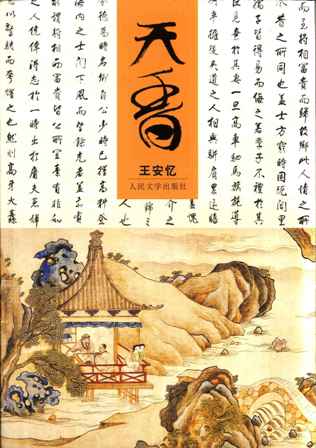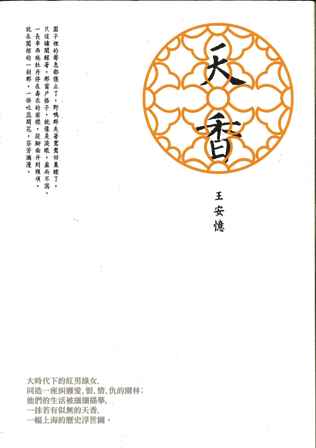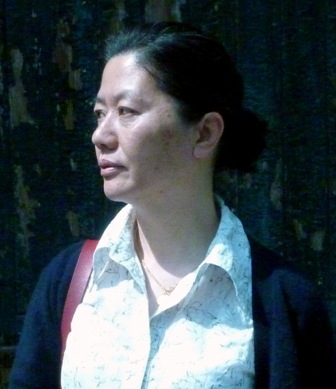Winner of The 4th Dream of the Red Chamber Award
Ms. Wang Anyi (Shanghai)
Beijing: People’s Literature (2011)
Taiwan: Rye Field Publications, Cite Publishing Ltd. (2008)
  |
Introduction to Winning Novel Scent of Heaven presents the story of four generations of the Shen family during mid-to-late Ming Dynasty. The Scent of Heaven Garden was known as one of the most beautiful gardens in the region of Jiangnan, and the broidery produced here – hand-made by their female family members – the best in the land. The novel itself is encyclopedic in scope, with rich characterisations of several dozen family members. Historical figures such as Xu Guangqi are merged into the scene naturally. The novel presents the finesse, depth and grandeur of Chinese cultural traditions, including details of the making of ink, playing classical instruments, and making of jam. In terms of plot, as the gardens of the Shen family fell into decline the embroidery prospered. The novel carries strong feminist undertones as most of the male members of the Shen family were weak-willed, and yet the female members including Xiao Diao, Shen Xizhao, Shen Huilan were all determined and talented, and they used the embroidery craft to support a family in decline. Their embroidery combined feminine needlework with the painting tradition of scholars, and presented a unique allure. The bonds of sisterhood were strong, surpassing life and death. The novel also promotes the status of traditional craftsmen while elevating what was in the periphery to the centre. The writing is elegant, clear and smooth, capturing a style that speaks to the great works of classical Chinese fiction. This novel is like an encyclopedia for the culture of the Southern Yangtze Delta region, a classic of the embroidery culture, and a masterpiece that vividly presents daily life, the interests and aspirations between four generations of protagonists, who come to life in this masterful work destined to become a classic of contemporary Chinese fiction. Professor Chung Ling Chairperson of the Final Judging Panel of the 4th The Dream of the Red Chamber Award |
|
Biography of the Awardee Ms. Wang was born in Nanjing, Jiangsu in 1954. She graduated in 1969 and is currently a Professor at the Department of Chinese of Fudan University, Vice Chairman of the Seventh National Committee of the Chinese Writers Association and Chairman of the Shanghai Writers’ Association. Ms. Wang’s works include novels, novelettes, short stories, essays and children’s books, including Documentary and Fiction, Song of Everlasting Sorrow, An Era of Sorrow, The Virgin Egg, An Era of Hermitage, Speaking to Myself, Sister Dear, Fu Ping, Romance and Love in Hong Kong, Ordination, I read, I see, Modern Living, Battle for Middle Street, The Gallant Maid, Story of the Uncle, Ruthless Heroes, Caltrop atop, Lotus root below, The Reading Codes of the Novelist, An Era of Enlightenment, The Alluring Moon, and others. Many of her works have been translated into different languages including English, German, Dutch, French, Czech, Japanese, Korean and Hebrew. Her most well-known novel, Song of Everlasting Sorrow, was recognised with a number of regional awards in the arts including the 4th Shanghai Literary Arts Awards, the 5th Mao Dun Literary Prize, and the first Hua Zong Literary Award organized by Sin Chew Daily. Her novel An Era of Enlightenment received a Jury Award at “The 2nd Dream of the Red Chamber Award”. |
 |
**********************************************************************************
Full text of Acceptance Speech by Wang Anyi at the Award Presentation Ceremony
This July I was in Wen Zhou. I took the riverside route along Nanqi River headed toward the Yantou Village. The village was established in ancient times, back in early Tang Dynasty. It was at its peak of activity during the reign of Jiaqing of Ming Dynasty, renowned for pioneering a comprehensive water supply and drainage system. This system sourced water from the Nanqi River at the North and supplied to the lower lands at the south. Culverts and trip-hammers divert the water, while lakes and reservoirs store the water for irrigation and domestic use. After passing 6km of water ways and 20 hectares of reservoirs, the water returned to Nanqi River. The waterworks were completed in the 35th year in the reign of Emperor Jiaqing, 3 years before the story of Scent of Heaven began. If I had come here before I wrote the novel, the Scent of Heaven Garden would be equipped with an independent water supply system, with culverts, trip-hammers and streams, giving the scenery a more refined air. More importantly, I could add one more name to the architects of the garden, and that would lead to more characterization and a much richer background! It was a regrettable that I had not had the chance to learn about it beforehand. Building a garden – even on paper – requires a combination of factors and fortunes. One needs to wait for the optimum chance but act at the decisive moment – once missed, the chance is forever gone. A lot of what we do is in the dark; we never know if we can actually use what we prepared, but what we actually need we may not have. Such “chance encounter”, is it something we can help realize through preparations? Or is it just blind luck?
At Nanshi, one of the oldest districts in Shanghai one could find old street names, for example Luxiang Garden Road, Qinglian Street, Wanzhu Street, Jiumoudi, and so on. Such names give clear reflections of how gardens were zoned in the old days. The Luxiang Garden was what I based on for my Scent of Heaven Garden. Re-conceptualizing a garden from several hundred years ago requires extensive knowledge in history, literature and a lot of imagination. These old names provide a direction and content for the building of Scent of Heaven Garden. I don’t have an obsession in archeological verification; nor an ambition in reconstructing history. It was just that I was clumsy – without a solid background I could not create a fictive world. By characters become alive only in a realistic environment, where they can fulfill their destinies. I had little emotional attachment to that era, but it happened that the story I wrote happened in those times. Municipal zoning changed the cityscape, and many of the old streets no longer exist. Even the administrative region of Nanshi has been incorporated as part of something else. As layer upon layer of history heaped upon Luxiang Garden, where shall my Scent of Heaven Garden take root, so that it may blossom?
In late 2008, I was arranging my chronology as I drew maps. The chronology began in the 38th year in the Reign of Emperor Jiaqing, and was compiled from bits and pieces of formal and folk history. The map was created on the basis of the ancient map of Nanshi, by comparing new and old names. Later, I put in my characters and gave them history. When the characters are placed in such time and place – both of which no longer exist – the landscape gain definition, as if it were activated. Sometimes things go backwards – I originally believed that the environment has to be definite before the people can take shape; yet inadvertently the people helped to clear up the haziness of their surroundings. It was the magical effects of imagination – one thing could decide another, or the growth could be mutual. What happens in the end has to be determined by the original intent of writing.
The story began with a local specialty of Shanghai: Gu Xiu, or Gu Embroidery. Gu Embroidery, in the modern history of this city, was something of an antiquity. Anecdotes have it that female members of the declining Gu family applied their needlework toward household upkeep and gave lessons to others, making a name for themselves. This became little more than a little known legend in our time. When history comes to Shanghai, it sped up exponentially, and many stories were lost in the crevices. Some of those crevices may be exposed, and this is where luck comes in. In all these years, it would struck me as curious that in certain old families the females would took charge of the household upkeep, and with none other with their needlework. Even in the modern days, with all the independence that the “new women” toted after the May Fourth Movement, I doubt they had such magnanimity and breadth of mind. Zi Jun in Sadness (Lu Xun) was dependent on Jun Sheng; Bai Liusu in Love in a Fallen City (Eileen Chang) strive for wifedom so that she could depend on Fan Liuyuan; Shu Sheng in Cold Nights (Ba Jin) had the desire to give Wang Wenxuan a home, yet ultimately failed because of the times; Ruan Ling-yu, renowned actor-singer of Shanghai, had the means of independence, yet she was robbed both of her virtue and wealth, and later succumbed to death… what kind of character were the ladies of the Gu family? What men were they supporting? What was the nature of that family? No violence or shake down from revolutions seemed to have visited upon this family. Every time I thought about it, the picture grew ever more animated, and my curiosity deepens. As the questions accumulated there was a sense of urgency – these characters are waiting for me, waiting for a place of unknown. It was history; it is the future, a future waiting to happen – a time of emptiness and unknown.
Novels are such pseudo-realistic things, and without something to prop them up they would be unbelievable. In the end we have to resort to historical facts. Historic materials, particularly those of Shanghai, were rather unreliable; they were closer to folk anecdotes than historic facts. History had it that Gu embroidery came from a mistress of the Gu family whose last name was already lost; her surname was Liu. This was the origin of my character the “Wen Daughter”. According to history the height of Gu embroidery was in the works of Han Ximeng – an embroidery master of Southern Song dynasty – many of which were collected by the Forbidden Palace and the Museum of Shanghai. This is the origin of my character Shen Xizhao. History also has it that the Gu Embroidery was renowned because of Gu Yulan. Widowed in her prime, Gu gave embroidery lessons to support her mother, mother-in-law and her young son. This is the origin of my character Hui Lan. With characters and the background from which they emerge, how does the “Wen Daughter” came to the Shen Family? (A note: the Shen family was de facto the Gu family. The name was changed to avoid confusion rather than to write a family history for Shanghai) How was she treated? What kind of person is the wife proper? Later, Xizhao had to take responsibility for the family, what is her background? The story has to be told from the beginning: if Hui Lan has to give lessons she has to set up her place in down town, where she would come to meet all sorts of people, commoners. Characters and events thus accumulate. Writing an ending for the characters was a sad matter, and as they leave one my one I felt most alone. When the story began it was late Ming Dynasty; when it ended it was the fall of Ming Dynasty. All that happened are from and of Ming Dynasty, and it was only natural that a garden of the Jiaqing Reign should be created.
Writing is like going on a long spiritual journey; when we return, the dream ends. I would like to thank the members of the judging panel. Receiving this honour and appreciation was really unexpected. Although this award is named after the Dream of the Red Chamber, I will not claim that my works are comparable to the achievement of that classic. To Chinese novelists, the Dream of the Red Chamber is a book from heaven that inspired us to write.
August 28, 2012
Shanghai
**********************************************************************************
Excerpt of comments of the Final Judging Panel
Wang Anyi is unquestionably one the most important writers of the Chinese literary circle. Some writers are concerned about how they could surpass others, but Wang Anyi, with her 30 years of writing experience, worried only about how she could surpass herself. After such distinguished novels as Documentary and Fiction, Song of Everlasting Sorrow, Fu Ping, Ruthless Heroes, Escape, Caltrop Atop, Lotus Root Below, scaling new heights might indeed present a problem. With Scent of Heaven, however, Wang Anyi broke new ground not only in style but for Chinese novels as a genre. By documenting the rise and fall of a great family, the detailed depiction of the traditional craft known as Gu embroidery, Wang Anyi created a prelude to the story of the great Shanghai. The masterpiece of Scent of Heaven is destined to be a new classic of the 21st century.
Professor Michael Berry
University of California, Santa Barbara
This book was an enormous piece of embroidery in itself – a self-sufficient universe where details were woven together through the founding, flourishing and later downfall of the gardens of Shanghai. Each minute detail is tightly woven: from the theories about painting, calligraphy, art and universe in Ming, to the human conception of time, life and death. It is an eclectic mix of everything: culture, craftsmanship, appreciation of utensils; culinary arts, festivals, rituals of marriage and burial… interpersonal relations are woven together in this closed classical world to create this amazing world of novel.
The wheels of time are unstoppable, like thunder clouds closing in from distance; the refinements of the southern literati, the aesthetic pursuits of the great clans transitioned into a civil society of vibrancy and self-containment.
Song of Everlasting Sorrow was the representative work of Wang Anyi, making her one of the most important novelists for the Chinese literary circle. She is at her best writing the fine, sensitive, repressed emotions of women, and this has made her works a classic. Scent of Heaven was, however, a work built from the ground; it has put great distance between itself and all the works written after the 1980s. It has created for itself a whole new set of rhetoric, and paints a new, warm mental picture for the Chinese psyche broken by the onslaught of modernity.
Mr. Lo Yi-chin
Winner of The 3rd The Dream of the Red Chamber Award for his novel Hotel Xixia



